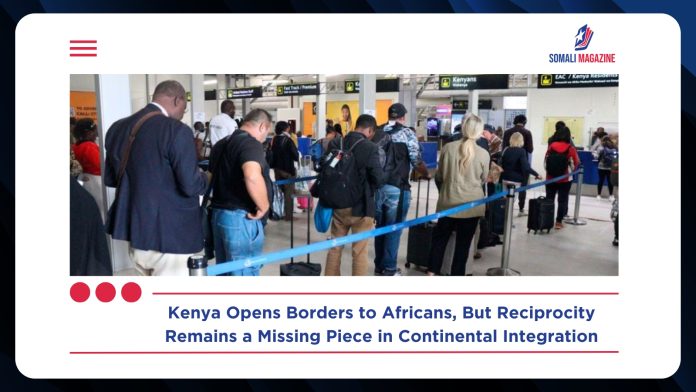Facebook Twitter (X) Instagram Somali Magazine - People's Magazine
Kenya opens border for Africans, reciprocity remains elusive, as the country rolls out a landmark visa-free policy for nearly all African and Caribbean nations, but struggles to secure similar access for its own citizens across the continent. The move, announced in January and fully implemented in July 2025, allows travelers from eligible countries to enter Kenya without Electronic Travel Authorization (ETA), visa fees, or lengthy forms—ushering in a new era of Pan-African mobility and tourism growth.
President William Ruto has championed the policy as a bold step toward regional integration, economic opportunity, and cultural exchange. Visitors from African nations can now stay in Kenya for up to two months, while East African Community (EAC) citizens enjoy a six-month stay under existing free movement agreements. However, Libya and Somalia remain excluded due to ongoing security concerns.
The visa-free initiative aligns with Kenya’s broader open skies strategy and its ambition to become a continental hub for tourism, trade, and innovation. The government has also introduced a digital nomad work permit and a 12-hour ETA for transit passengers, allowing travelers to explore cities and attractions during layovers.
Yet, despite Kenya’s sweeping reforms, many African countries have not reciprocated. Kenyan passport holders still face visa requirements in over 30 African nations, including Algeria, Egypt, and South Africa. This imbalance has sparked frustration among citizens and policymakers, who argue that true integration must be mutual.

“We’ve opened our doors, but others haven’t opened theirs,” said a senior official at Kenya’s Ministry of Foreign Affairs. “It’s time for the continent to walk the talk on free movement.”
The African Union’s Agenda 2063 and the African Continental Free Trade Area (AfCFTA) both advocate for visa-free travel across the continent, but implementation remains patchy. Only a handful of countries—Rwanda, Ghana, Seychelles, Benin, and The Gambia—currently offer unrestricted access to all African nationals.
Kenya’s decision has already sparked a surge in regional interest. Hotels in Nairobi report increased bookings from Accra, Lagos, and Harare, while travel agencies are rolling out new packages for African families and youth travelers. Fintech firms, agribusinesses, and creatives are exploring cross-border partnerships, and event organizers are planning expos and festivals to capitalize on the new mobility wave.
However, the influx also places pressure on infrastructure. Airports, roads, and hospitality services must scale up to accommodate the growing wave of inter-African movement. The government has pledged to expand fibre optic coverage and streamline passenger processing through a new information system.
As Kenya positions itself as a gateway to East Africa, the lack of reciprocity threatens to undermine the spirit of unity and shared prosperity. Analysts warn that unless more countries follow suit, the dream of a single African passport and seamless mobility will remain out of reach.
For now, Kenya’s visa-free policy stands as a powerful symbol of openness and leadership. But the journey toward full continental integration requires collective action—and a willingness to match generosity with fairness.

